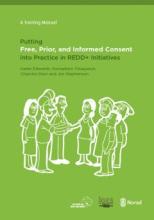/ library resources
Showing items 1 through 9 of 134.Forestry has long been viewed as the domain of mitigation efforts. Without a doubt, the world will be hard-pressed to meet the targets of keeping the global temperature rise below 2 degrees Celsius without including the carbon-sink role played by forests.
The principle that indigenous peoples and local communities have a right to give or withhold their Free, Prior, and Informed Consent (FPIC) to developments affecting natural resources is not new.
By assessing community forestry in a participatory way with community forestry user groups, practitioners can better help these groups increase the effectiveness of their community forests and identify areas for improvement.
In 2019, the Food and Agriculture Organization of the United Nations (FAO) published a framework to provide important insights into the successes and shortcomings of community-based forestry at the country level.
This toolkit is designed to guide the business manager (or whoever is tasked with the daily operations of running the forest business) and other business staff through a process of identifying and assessing possible business risks.
This guide aims to support states, community-based organizations, civil society organizations, the private sector and other relevant actors, to take proactive measures to implement the standards and recommendations of the Voluntary Guidelines on the Responsible Governance of Tenure (VGGT).
While participation is seen as an important part of sustainable natural resource management, it is not always successful – a number of studies to date indicate conflicting values and power inequalities can significantly undermine participatory processes.
This chapter, on community forestry development in Cambodia and RECOFTC's role, is part of a larger publication Forests for People, put together by the UN Forum on Forests for the International Year of Forests, 2011. On February 9, DESA’s UN Forum on Forests Secretariat launch
Within the debate about rural development policy (RDP), there has been increasing call for a stronger territorial focus emphasising the potentials, resources and demands of regions.
Paginación
Land Library Search
Through our robust search engine, you can search for any item of the over 73,000 highly curated resources in the Land Library.
If you would like to find an overview of what is possible, feel free to peruse the Search Guide.







